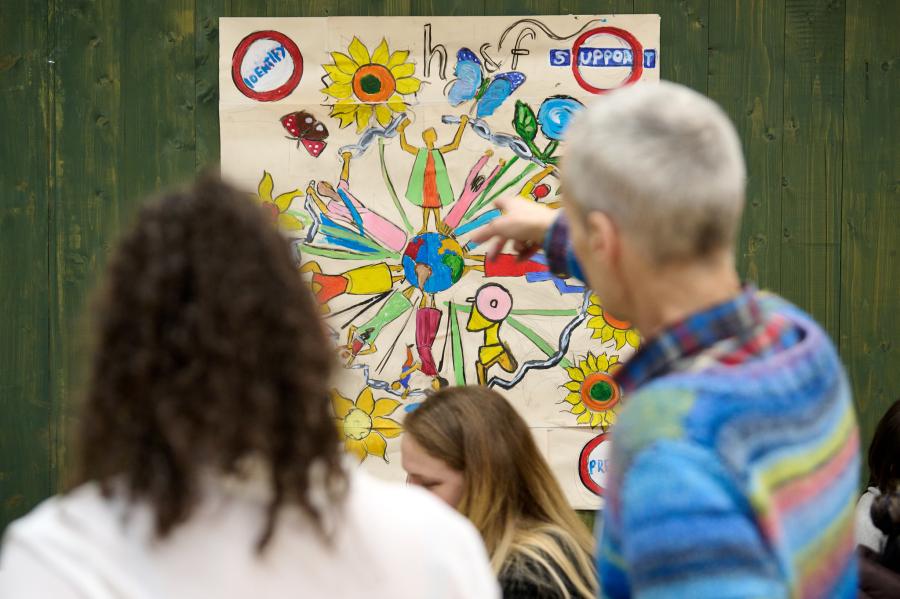
What is modern slavery?
Modern slavery is a serious crime and a violation of Human Rights.
Modern slavery is complex but simply put, it involves taking advantage of an individual's vulnerability to force, threaten, coerce and/or deceive them into doing something against their will. This may include forcing an individual to commit crimes or, paying someone very little or no money for their work.
Anyone can experience modern slavery regardless of their age, gender, nationality, religious and/or cultural background. In the UK, the most prominent forms of Modern Slavery include:
- Forced or compulsory labour
- Domestic servitude
- Criminal exploitation
- Sexual exploitation
- Organ harvesting
Our response to modern slavery
"In Hammersmith & Fulham, compassion is at the heart of everything we do, and we are determined to play our part in eradicating modern slavery – whether it's happening within our borough or elsewhere. To make sure we're doing that, our inaugural modern slavery strategy has been co-produced by partners, including by survivors and residents. The strategy recognises that it is everyone's responsibility to tackle modern slavery. By working together, we can all play our part in preventing exploitation, bringing exploiters to justice, ensuring the best support for survivors, and eradicating modern slavery in Hammersmith & Fulham" Cllr Sue Fennimore Deputy Leader Hammersmith & Fulham Council.
Hammersmith & Fulham Modern slavery strategy sets out our objectives for the next five years and how we will achieve them.
Ending Modern Slavery in Hammersmith & Fulham (pdf 1MB)
For a plain text version of the strategy see Ending Modern Slavery in Hammersmith & Fulham (text version pdf 500KB)
Our strategy was developed in conjunction with Stop the Traffik and we have been championing a multi-agency response to modern slavery since the formation of the Modern Slavery & Exploitation (MSE) Group in 2013. The council, police, NHS and over 15 NGOs make up the MSE Group and we're working together to shape the strategic response to ending modern slavery. We recognise that some people are disproportionately at risk of exploitation and/or have limited access to resources. Exploiters take advantage of these vulnerabilities.
We will regularly review the Modern slavery strategy in line with our Equalities Strategy and our Social Value Strategy to ensure we remove barriers to inclusion and inequalities that persist in our communities.
Our objectives
Objective One: Victims identified - Identifying people as victim/survivors of modern slavery is important in making sure they can access appropriate support.
Objective Two: Exploitation prevented - By investigating exploitation and empowering individuals to know and exercise their rights, we can prevent exploitation.
Objective Three: Victims supported - Victim/survivors of modern slavery can have a range of needs and our approach is both holistic and trauma-informed.
Objective Four: Exploiters bought to justice - Modern slavery is a crime and exploiters must be brought to justice to prevent them from exploiting others.
Recognising modern slavery
If you suspect someone is a victim of modern slavery, it is essential that you report it to the relevant authorities. Please do not confront the controller as it is may put both yourself and the victim at harm.
By knowing the signs of modern slavery, you can help stop it. Here's what to look out for!
- No access to personal documents and forms of ID
- Unable to provide details of their home or work address
- Unfamiliar with the local language, area, and context
- Unable to leave their workplace
- Movements controlled by someone else
- Allowing others to speak for them
- Prevented from speaking with others
- Providing accounts that sound rehearsed and scripted
- Appearing fearful, anxious withdrawn and malnourished
- Displaying signs of physical and psychological trauma
- Injuries that may be a result of physical harm and force
- Reported as missing from home and school (children)
- Believe that they have a debt to pay off
- Threats made towards their family if they do not repay the debt
- In possession of items of concern such as multiple phones, large amounts of cash and drug paraphernalia
- Repeated unwanted pregnancy and sexually transmitted infection.
Learn to spot the signs of modern slavery by visiting the Unseen UK website.
For more information on the forms, indicators and referral pathways of modern slavery please visit the Stop The Traffik website.
How can I report modern slavery?
There are various way to report concerns of modern slavery, however, in an emergency you should always call 999.
If the situation does not require an emergency response you can also report your concerns to the Police through 101 or online via www.met.police.uk/ro/report
Where can I access support and advice?
If you feel you have affected by modern slavery or have concerns for someone else, help is available.
Council support
To discuss your concerns with a member of our Adult Social Care team, please contact:
- 020 8753 4198 (select option 3)
- 020 8748 8588 (out of hours)
- safeguardingadults@lbhf.gov.uk
- For local services, visit the Angelou Partnership website.
The Modern Slavery and Exploitation Helpline
Modern slavery in our supply chains
We have signed the Charter Against Modern Slavery. The charter makes a clear statement that modern slavery has no place in our supply chains. Signing the statement is our pledge to proactively vet supply chains to ensure modern slavery is not taking place within them.
Find out more about the Co-operative Party Charter Against Modern Slavery, why it was important to commit to it, and read a detailed outline of our commitments.
Modern slavery and human trafficking statements
Modern slavery and human trafficking statement 2023-24
Modern slavery and human trafficking statement 2022-23
Modern slavery and human trafficking statement 2021-22
Modern slavery and human trafficking statement 2020-21